To Adapt or Not to Adapt
All I'm Askin' For Is a Little R-E-S-P-E-C-T
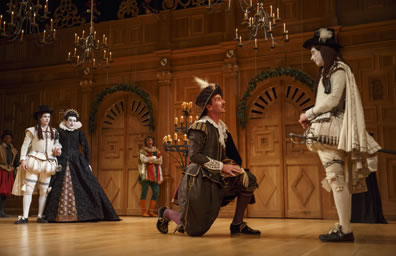
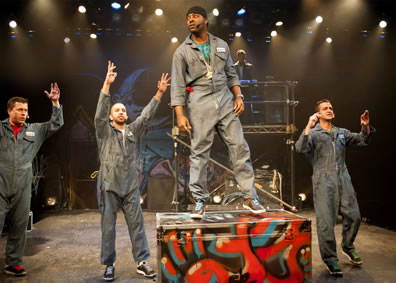
Top, the Shakespeare's Globe original practice production of William Shakespeare's Twelfth Night, shown here in its Broadway run, starring Mark Rylance as Olivia (in back in black). Photo by Joan Marcus, Shakespeare on Broadway. Bottom, the hip-hop adaptation of Shakespeare's Othello by the Q Brothers (flanking the trunk), Othello: The Remix, at Chicago Shakespeare Theater. Photo by Michael Brosilow, Chicago Shakespeare Theater.
Comments from two highly respected Shakespearean actors sparked a debate on Reddit a couple of weeks ago about what merits a “good adaptation” versus a "bad adaptation" of William Shakespeare's works. Mark Rylance in an interview published in The Guardian said that William Shakespeare's works need to be censored for their anti-Semitism. “There are some very unfortunate anti-Semitic things that characters say,” the article quotes him. “If a character says it, it doesn't mean the author means it but since the Holocaust … these statements have a lot more resonance now than they did at that time.” Simon Russell Beale, also in The Guardian, opined that productions need not be pure with Shakespeare's text. “You can do what you like with it—as long as you make coherent, emotional sense,” The Guardian quotes Beale. “I see absolutely no problem in throwing Shakespeare around. The texts will, hopefully, always be there.”
These are two sides of the same editing coin: Censoring text for the sake of a modern audience's comfort level and revising text for the sake of a modern audience's understanding. I'm going to dispense with the first one right now: In my opinion, censorship of art is wrong for any age (from Shakespeare's own time through the bowdlerization of the 19th century to the political correctness vigilantes of today). True, on this website I engage in a form of censorship by refusing to perpetuate hateful language, false information, or vulgarity. However, if you are going to present a work of art, whether it's The Merchant of Venice or Birth of a Nation, the offensive elements are part and parcel to its art in delving into the varying shades of human nature and the human condition. When producing The Merchant of Venice, to leave in Shylock's “hath not a Jew” speech but remove the enthusiasm with which he seeks Antonio's pound of flesh, or to present Portia as heroic while cutting her blatantly racist remarks is to deny Shakespeare's truthful portrayal of our very selves. Does it make us uncomfortable? Absolutely: welcome to the art of drama.
But why does mere revision make so many Shakespeare fans so uncomfortable? Some people don't like any alterations to Shakespeare's text nor even presenting them in anything other than their historical settings. To me, such an ultrapurist approach can lead to what I somewhat derisively call “museum piece Shakespeare”—though, I must say, I do enjoy visiting and spending hours in museums, and among my favorite stagings of Shakespeare are text-centric, historically costumed productions. But even these are cut for length. Furthermore, to varying degrees, each could be called an “adaptation” because any time an actor picks up a Shakespearean role, he or she is adapting it for that production, and sometimes adapting it from performance to performance, depending on the theater and audience.
That turns us to a discussion of defining adaptation, and I don't want to go down that rabbit hole, except to point out that “adaptation” is in the eye of the beholder. For example, for his production of King Lear at Stratford Festival last year, director Antoni Cimolino wrote in his program notes that he set his production in the time of Jacobean England—i.e., the time of Shakespeare's writing the play. This might inspire a “well, duh!” kind of response in some, but it's a poignant point. On the one hand, King Lear himself lived in prehistoric Britain, so that would seem to be the appropriate “historic” setting. On the other hand, Cimolino chose his setting for thematic reasons, not out of a sense of Shakespearean purity: the London in which Shakespeare lived and worked was fraught with gurgling social schisms as the Puritans were gaining political power—schisms that would erupt into outright civil war within 40 years of Shakespeare writing King Lear. Such schisms Cimolino wished to highlight in his production to reflect on 2014 current affairs. Staging King Lear in Shakespeare's time, then, was part of Cimolino's adaptation of the play. He also incorporated homeless people into the action, portrayed Edgar as a drunk party boy, and made some key cuts in Edmund's lines to make him completely humorless. This, by the way, was the best King Lear I've ever seen, so I consider it a "good adaptation."
Just as text-centric productions are among my favorites, so, too, do productions with radical stagings and revisions rank high on my lists. Faction of Fools in Washington, D.C., staged a commedia delle'arte version of Romeo and Juliet that is so popular it remains in the company repertoire three years on. I know some Shakespeare lovers who steadfastly believe you should never turn Shakespeare's tragedy of star-crossed lovers into a play of slapstick hijinks; however, the commedia delle'arte practioner scholars that comprise Faction of Fools know Shakespeare was likely influenced by that particular theater form, so this adaptation may be closer to the original version than any other version you've seen. Plus, the play's tragic element is very much in play (just as Shakespeare kept the comic element very much in play even as Romeo and Juliet enters its climactic ending), and I've never seen a more moving Mercutio death scene than this production features (in large part because of the slapstick leading up to his actual demise). Another of my all-time favorite stage productions is the Q Brothers' rap version of Othello: The Remix. This show doesn't just do a flow staging of Shakespeare's text but replaces the original story with that of a hip-hop artist named Othello and the members of his crew, Iago and Cassio. Despite the hip hop setting and rap structure, Othello: The Remix is Shakespearean to the core in its themes, imagery, and character portrayals.
Mention these or even the simple matter of staging, say, Much Ado About Nothing in the disco-fevered 1970s to some Shakespeare fans—those self-described as “purists”—and you'll get shudders or rebukes usually containing the g-word: gimmick Shakesepeare. I will spell out my position in full: r-e-s-p-e-c-t. At whatever degree of adaptation, success as a Shakespearean product depends on respect for what Shakespeare originally wrote. This starts with full grasp of the metaphor-driven, rhythmically constructed language of the play. Even an Elizabethan-costumed, British-accented, pure-text production of Romeo and Juliet can be a "bad adaptation" if the actors and director don't respect the text.
If you only watched the trailers, you might be inclined to believe that Carlo Carlei was truer to Shakespeare with his lush, Verona-location Romeo and Juliet two years ago than Luhrmann was with his 1996 pistol-toting, gangsta-style adaptation of Romeo + Juliet. In the latter, some of the actors couldn't master the verse, but Luhrmann not only captured the sex-and-violence passion and generational angst of Shakespeare's original he incorporated much of the play's allegorical arcs into the visuals (along with some shout-outs to Shakespeare's whole body of work). I thought it was a most respectful rendetion of Shakespeare's play and enjoyed it as great filmmaking. Carlei's version, however, utterly failed because its very fabric (lush fabric though it may have been) was constructed from a faulty foundation: screenplay writer Julian Fellowes “updating” Shakespeare's text under the premise that only university doctorates can understand the original. Other than revealing himself to be the uneducated one—he's not visited fourth-grade classes staging the play or theaters where tweens hang on every “archaic” word (while the tweens sitting in front of us at the movie ridiculed Fellowes's script as dumb)—Fellowes lost sight of the essence that makes Shakespeare's play so timeless, that it's a tragedy of the heart and all that pumps through it, not an intellectual exercise.
To further illustrate the spectrums of adaptation and respect, here are three examples of Julius Caesar stage productions over the past couple of years:
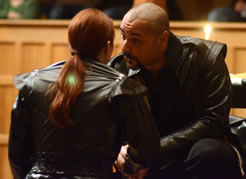 The American Shakespeare Center's 2013 Actors' Renaissance Season production is as pure as you can get. With no director or design team, the actors themselves stage the play, with only about five days of rehearsal in a replica of Shakespeare's Blackfriars theater. They costumed themselves as Shakespeare's company did—which is to say they wore either contemporary clothes or thematic outfits (there is a drawing of a Shakespeare-contemporary production of Titus Andronicus in which some of the characters are in togas, others in Elizabethan armor, so Shakespeare himself did not adhere to historical setting). Because the actors are so thoroughly trained in verse-speaking and, per the ASC's credo, maintain utmost respect for the text as written, this highly rhetorical play nevertheless simmered with suspense, from the tension of the conspirators nervously plotting Caesar's assassination to the deeply psychological interchanges of Brutus and Cassius, from the conflicted characterization of Caesar's bluster amid his insecurities to Antony's maneuvering through a coup in which he goes from next target to tide-turner. [Photo by Pat Jarrett, American Shakespeare Center.]
The American Shakespeare Center's 2013 Actors' Renaissance Season production is as pure as you can get. With no director or design team, the actors themselves stage the play, with only about five days of rehearsal in a replica of Shakespeare's Blackfriars theater. They costumed themselves as Shakespeare's company did—which is to say they wore either contemporary clothes or thematic outfits (there is a drawing of a Shakespeare-contemporary production of Titus Andronicus in which some of the characters are in togas, others in Elizabethan armor, so Shakespeare himself did not adhere to historical setting). Because the actors are so thoroughly trained in verse-speaking and, per the ASC's credo, maintain utmost respect for the text as written, this highly rhetorical play nevertheless simmered with suspense, from the tension of the conspirators nervously plotting Caesar's assassination to the deeply psychological interchanges of Brutus and Cassius, from the conflicted characterization of Caesar's bluster amid his insecurities to Antony's maneuvering through a coup in which he goes from next target to tide-turner. [Photo by Pat Jarrett, American Shakespeare Center.]
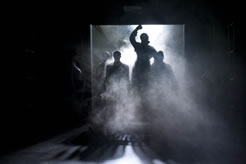 Phyllida Lloyd's Donmar Warehouse production, which we saw in 2013 at St. Ann's Warehouse in Brooklyn, was set in a women's prison, though it generally kept Shakespeare's text intact (some extraneous matter was added as part of the depiction of prison life). Through the setting, we felt viscerally the tension of a society ruled by a tyrannical egomaniac that Shakespeare portrays in his play; meanwhile, we quickly accepted the female prisoners as ancient Roman characters, such was the level of acting skills and dedication to the text. Even when the production took an unexpected turn into a new format—we suddenly discovered that we were watching the prisoners merely staging the play rather than being the play—it maintained the deep psychosis of Shakespeare's portraits. Then, with one final plot twist, the production gut-punched us with an exclamatory visual pounding home Shakespeare's depiction of despotism in both personal and political practice in today's world. [Photo by Pavel Antonov, St. Ann's Warehouse.]
Phyllida Lloyd's Donmar Warehouse production, which we saw in 2013 at St. Ann's Warehouse in Brooklyn, was set in a women's prison, though it generally kept Shakespeare's text intact (some extraneous matter was added as part of the depiction of prison life). Through the setting, we felt viscerally the tension of a society ruled by a tyrannical egomaniac that Shakespeare portrays in his play; meanwhile, we quickly accepted the female prisoners as ancient Roman characters, such was the level of acting skills and dedication to the text. Even when the production took an unexpected turn into a new format—we suddenly discovered that we were watching the prisoners merely staging the play rather than being the play—it maintained the deep psychosis of Shakespeare's portraits. Then, with one final plot twist, the production gut-punched us with an exclamatory visual pounding home Shakespeare's depiction of despotism in both personal and political practice in today's world. [Photo by Pavel Antonov, St. Ann's Warehouse.]
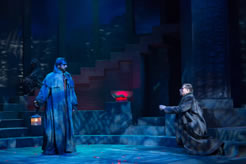 At the Folger last year, director Robert Richmond decided Shakespeare's parable of political intrigue was really a lesson on why nations go to war, so he set his production in 1914 Sarajevo and the trenches of World War I. The extraneous stage business from ghostly figures scattering poppies whenever a character died to Caesar's ghost becoming a lantern bearer had no allegorical relevance to Shakespeare's original. Sure, they were speaking Shakespeare's text—some of it, anyway (several key character developoment scenes were cut to make room for the slow motion zombie pageantry)—but with the actors failing to understand the conflicted natures of their own characters, the play's rhetoric became just that—rhetoric, even in the scenes of the fomenting conspiracy. [Photo by Teresa Wood, Folger Theatre.]
At the Folger last year, director Robert Richmond decided Shakespeare's parable of political intrigue was really a lesson on why nations go to war, so he set his production in 1914 Sarajevo and the trenches of World War I. The extraneous stage business from ghostly figures scattering poppies whenever a character died to Caesar's ghost becoming a lantern bearer had no allegorical relevance to Shakespeare's original. Sure, they were speaking Shakespeare's text—some of it, anyway (several key character developoment scenes were cut to make room for the slow motion zombie pageantry)—but with the actors failing to understand the conflicted natures of their own characters, the play's rhetoric became just that—rhetoric, even in the scenes of the fomenting conspiracy. [Photo by Teresa Wood, Folger Theatre.]
The first production respected Shakespeare's Julius Caesar exactly for what it was, and it was not only great Shakespeare but also edge-of-your-seat theater. The second respected Shakespeare's themes and atmosphere while keeping his script intact (and well acted), and it worked as squirm-in-your-seat theater as well as great Shakespeare. The third tried to turn Shakespeare's play into something it was not, not only failing as a Shakespearean product but failing to even keep some audience members in their seats.
This is my cautionary lesson for those directors and actors who think they are smarter than Shakespeare, who impose their own interpretations and conceptual contexts on Shakespeare, who diss Shakespeare with glib or ironic approaches to his work, who see the manner in which he theatrically crafted his plays as archaic, or who think their audiences are too stupid or, worse, too modern to get Shakespeare. Remember: Shakespeare's popularity has lasted for more than 400 years, so if you start, work, and finish with a respect for the man's theatrical craftsmanship, still-relevant portrayals, still-understandable wordplay, deployment of imagery, and plot devices, your audience will likely have much more respect for your efforts.
That said, respect is not to be equated with reverence. Shakespeare was a genius, a brilliant playwright, but he was not perfect. He made mistakes in his plays, notoriously in timelines and geography but also in characters (he couldn't keep Rosalind and Celia straight in the first few scenes of As You Like It). Sometimes he simply comes up short as a storyteller: I still consider that whole marry-my-niece-as-penance plot twist in Much Ado About Nothing to be incredibly stupid, though I grant I've seen it serve its dramatic purpose in some well-staged productions (so, yeah, who's the stupid one). In my review of {Your Name Here} A Queer Theater Company's 2013 production of Juliet & Romeo, my primary complaint of their adaptation turning the lovers into a lesbian couple was that they stuck too closely to Shakespeare's text instead of bending his characters a bit further to arrive at a place I felt would be closer to not only the production's intended truths but Shakespeare's, too.
Lost in some of the reaction to Beale's comments about taking liberties with Shakespeare is his assessment of the subtleties of what works and what doesn't. He cites as an example the word lazar which means leper—might as well use leper, he says. But he also points to want as an Elizabethan synonym for the modern term lack; so if you “want something” you might as well say you “lack something,” he says. That may make the meaning clearer but, as Beale points out, “Lazar and leper is quite good as a fit, but want and lack isn't.” Beale's backtracking even at the time he's making his point illustrates the conundrum of revising, adapting, or merely tweaking Shakespeare. "It is a problem," he says.
Still, I would champion anybody using Shakespeare's works to further explore the human condition or various truths of the cosmos and the psyche, whether it's through staging an original practice, original pronunciation production of one of his plays, radically re-imagining the setting of one of his plays, doing a modern revision of one of his plays, or taking several of his plays and scrambling them into a new story. Just remember Beale's ultimate conclusion: “You mess around at your peril.” But if you proceed with respect for Shakespeare, you'll be in his good hands.
Eric Minton
March 6, 2015
The links bar on the right side of this page contains links to my reviews of the more significant adaptations of Shakespeare's plays I've seen and how well they work as Shakespeare and as theater.
Comment: e-mail editorial@shakespeareances.com
Start a discussion in the Bardroom



 Find additional Shakespeareances
Find additional Shakespeareances